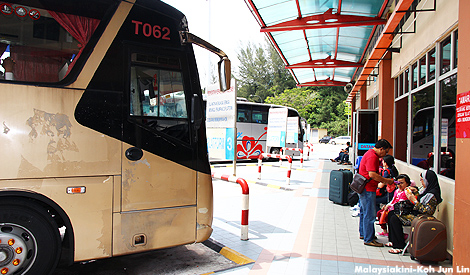LETTER | The Land Public Transport Commission (Spad) wishes to add more context to YS Chan’s letter Death of stage bus companies imminent.
Spad has established several initiatives aimed at improving stage and express bus services, in tandem with the government’s vision of offering reliable, relevant and affordable bus services, via the Government’s Stage Bus Service Transformation Programme (SBST) implemented in 2015 as well as the Interim Stage Bus Service Fund (ISBSF) since 2012.
Operating under the myBAS brand, SBST is a long-term plan which aims to improve stage bus services by mitigating an outdated business model, which often sees stage bus operators mainly plying routes based on commercial considerations rather than passengers’ needs.
With an initial investment of RM100 million, Spad introduced the myBAS services in five cities as part of a pilot project to improve the mobility and access for the people.
Under the SBST model, stage bus companies in the capital states will focus on giving the best services for the people, while operating profitably on a gross cost mechanism.
In implementing myBAS, Spad engaged state and local authorities as well as grassroots leaders to understand the different needs of the community. Even after the service roll-out, the commission continues to take public feedback into account as it strives to enhance and refine the network.
The myBAS services that are now running in Kangar, Seremban and Ipoh have reached a cumulative ridership of 9.3 million people (or 400,000 passengers a month), operating along 51 routes with a combined distance of 1,434km.
With enhanced inter-town connectivity to amenities and key transport nodes including bus terminals and KTM stations, we are optimistic that ridership will continue to rise.
Even as myBAS network is being expanded, the government is expected to further fund ISBSF this year for the benefit of 63 stage bus operators.
As of December 2017, the government had spent RM620 million to provide a lifeline to the stage bus operators plying social routes across the nation.
To resolve the problem of overlapping bus route coverage, especially over the more lucrative routes, Spad undertook the Klang Valley Bus Network Revamp (BNR) in 2015.

BNR managed to resolve the unhealthy level of competition among eight bus companies, excluding Rapid Bus Sdn Bhd.
BNR has increased bus capacity in congested routes and deployed new routes in under-served areas and neighbourhoods to drive a wider bus network.
It has also streamlined the bus route numbering system so that it is standardised across all operators.
Under BNR, each company was allocated a dedicated corridor which enabled them to increase their ridership and subsequently increase their fare box revenue.
Under BNR, Spad also weeded out operators with poor service standards, resulting in more reliable services for commuters.
In an attempt to discourage the use of private vehicles coming into the city and reduce carbon emissions, Spad introduced the free GoKL city bus service in 2012.
Focused on high demand areas, especially those with high workforce and tourists, GoKL offers 4 lines covering more than 14 shopping centres, 30 hotels, 10 education institutions, 8 religious buildings, 14 tourist attractions, other than stopping at more than 5 public transport hubs.
Nearly 70 percent of GoKL users are Malaysians.
Spad is also currently finalising the Express Bus Transformation Plan (EBTP) in order to ensure a sustainable express bus industry.
The recent announcement in Budget 2018 to introduce technology-based initiatives for express buses with an allocation of RM45 million is aimed at minimising accidents arising from human errors and fatigue.
EBTP is expected to address the main causes of fatal traffic accidents involving express buses, such as driver fatigue, other than unsafe practices such as using mobile phones while driving.
Beyond short-term needs, our priority is to continue investing for the future. The Commission remains focused on building capabilities and sustainability of the bus sector by developing safe, relevant and reliable services to make buses a choice mode of travel for commuters.
The views expressed here are those of the author/contributor and do not necessarily represent the views of Malaysiakini.

